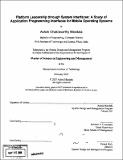Platform leadership through system interfaces : a study of application programming interfaces for mobile operating systems
Author(s)
Mandala, Ashok Chakravarthy
DownloadFull printable version (19.90Mb)
Other Contributors
System Design and Management Program.
Advisor
Michael A. Cusumano.
Terms of use
Metadata
Show full item recordAbstract
The Smart Mobile device industry is witnessing rapid growth with the increased convergence of voice-centric mobile phones and data-centric personal digital assistant systems. Improving capabilities in device hardware have allowed development of complex user interfaces, multimedia and communication capabilities on these devices. Modem Mobile Operating Systems manage this complexity in the mobile device by administering hardware resources and providing a platform for development of new consumer and enterprise applications. This thesis studies the architecture, design goals and services offered by the three major mobile operating systems - Palm OS, Symbian OS and Windows Mobile.The Mobile Operating Systems studied in this thesis differ in their architectures, services and programming interfaces offered to application software developers, independent hardware vendors and OEM licensees. Their design reflects the OS vendor's strategy toward the mobile platform which is decipherable based on a study of the OS architecture and application programming interface. Three conclusions are made based on this study each of them suggests a strategy that the vendor has attempted to use to gain platform leadership through product architecture and degree of openness of interfaces.
Description
Thesis (S.M.)--Massachusetts Institute of Technology, System Design and Management Program, 2007. Includes bibliographical references (p. 98).
Date issued
2007Department
System Design and Management Program.Publisher
Massachusetts Institute of Technology
Keywords
System Design and Management Program.